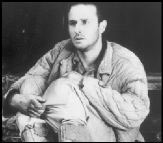THE GREY ZONE
written and directed by Tim Blake Nelson
opens Oct. 25 at Seven Gables
MUST WE HAVE another Holocaust drama? Yes, according to Tim Blake Nelson, who’s adapted his 1996 play into an unrelentingly grim portrait of a horrible situation where, as one Auschwitz inmate observes, “There is no meaning.” Dramatizing the true story of Hungarian Jews who briefly prolonged their lives as Sonderkommandos abetting the Nazis (lying to new arrivals, sorting their belongings, disposing of their corpses, and so forth), The Grey Zone certainly gives its cast a workout in suffering and moral debate (“We’re not murderers!”). Rival Jewish factions argue about resistance and complicity; then the miraculous survival of a girl from the gas chambers threatens both the potential rebels and live-another-day collaborators.
Hungarian and German are both rendered in English, creating some confusion, but Nelson amply communicates the overwhelming gloom, despair, and horror of the concentration camps. Based on materials including Primo Levi’s The Drowned and the Saved and the memoirs of Dr. Miklos Nyiszli (who assisted Mengele in his “experiments” on children), Zone represents a brutal new chapter in Holocaust literature, one that I think would’ve been better served as documentary, not a stage-bound, rather clunky drama that often sounds like David Mamet gone to Auschwitz.
ON A RECENT visit to Seattle, Nelson—whose grandparents escaped from Nazi Germany in 1938, just before Kristallnacht —expressed fatigue with the old Anne Frank-stereotype of Jew-as-simple- victim. “I’m so impatient with a reductive and familiar approach to the Holocaust. I was interested in debunking that. The Sonderkommandos seemed to me the way in. Like them, I’m an able-bodied Jewish male in my 30s. And I felt a connection.”
In addition to his characters speaking in curt Beckett-like exchanges that befit their cruelly, existentially absurd dilemma, Nelson sees other rifts with tradition: “Internecine hatred between different Jewish groups. And particularly assimilated urban Jews despising and even blaming rural quote-unquote shtetl or Eastern European Jews and looking down on them in a way that has the virulence of racism.”
It’s an ugly picture on both sides of the barbed wire—everyone is morally compromised. Can moviegoers handle it? “I think that Jews are ready and even eager for the sort of self-examination and nuanced approach that this film tries to take,” he says. I think that Jewish audiences are perhaps even tired of sentimental, uplifting Holocaust movies. They don’t need to be spoon-fed anything.”









